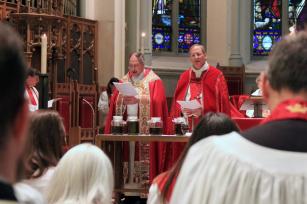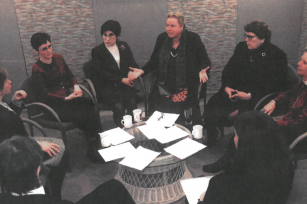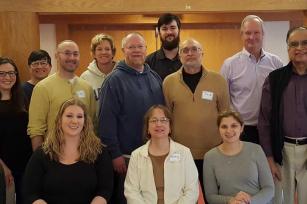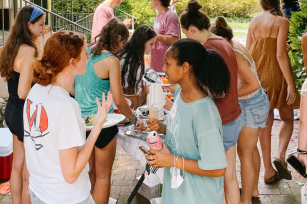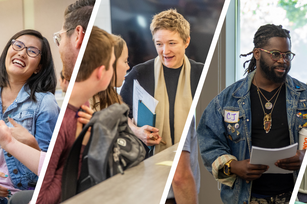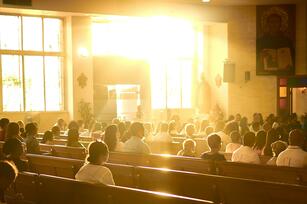
Breadcrumb
- Essential Partners
- Our Impact
- Impact Stories
- Fostering Open Dialogue in Evangelical Congregations
Fostering Open Dialogue in Evangelical Congregations
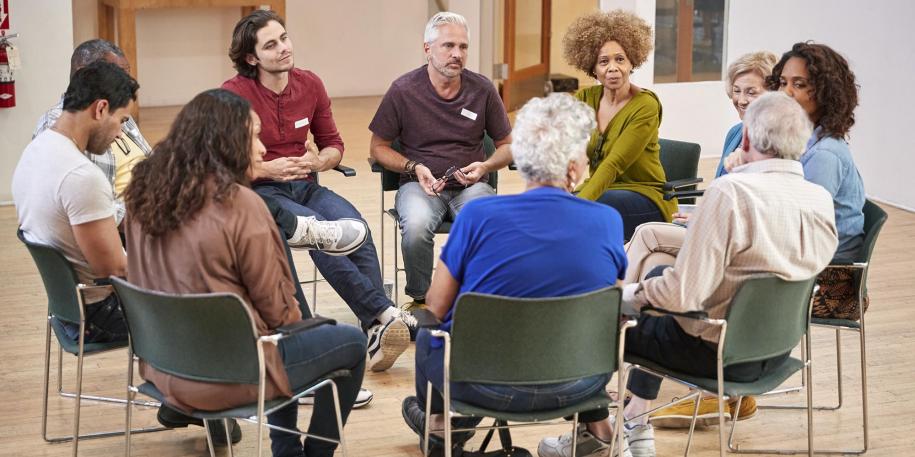
“Essential Partners has been indispensable. I thought John was going to briefly review our dialogue designs. Instead, we looked at every question, every situation, for every dialogue. He provided exercises that helped people learn to listen and speak differently and to strip away stereotypes.”
Rob Barrett, Chief Programming and Innovation Officer
Colossian Forum, Michigan
What does it mean to be Christian together? In diverse congregations and communities across the United States, Christians have been asking this crucial, fundamental question, prompted by divisive political issues, social changes, and long-standing theological debates.
Founded in 2013, the Colossian Forum hopes to help people of faith wrestle with that question. Its mission is to equip Christian leaders to transform cultural conflicts into opportunities for spiritual growth and witness.
They initially pursued this goal through forums, community events, and workshops as well as books and resources. But it soon became clear that a shift would be necessary for the Colossian Forum to broaden and deepen its impact.
“We really knew the theology and discipleship,” says Rob Barrett, Chief Programming and Innovation Officer. “but we weren’t as steeped in dialogue theory and design. We had been facilitating these conversations, helping people do the transformational work of, as Paul writes to the Ephesians, putting off the old and putting on the new—but it had been intuitive.”
Rob and his colleagues hoped to shift their approach from facilitating difficult conversations to equipping their community to hold hard discussions. To teach others dialogue and facilitation skills, they needed support and expert guidance. That’s when they connected with Essential Partners.
Indispensable Partners
After a series of conversations about their challenges and capacities, EP’s John Sarrouf planned to collaborate with Collosian Forum on the design of a single curriculum. John traveled to observe a Colossian Forum event in preparation.
“To gain the trust of a community so fully, in the way the Colossian Forum has, is remarkable,” he says. “They were leading these thorny conversations with so much thought and care. I was hugely impressed. I really wanted to support them in making the most of that connection and trust.”
Seeking ways to keep people engaged, Colossian Forum initially guessed that turning up the temperature on their conversations would keep people involved. But silence tends to dominate when spaces don’t feel safe enough. When people feel that sharing a deeply-held conviction will devolve a dialogue into a fight, they clam up.
John was determined to help make the Colossian space safe enough for people to say the difficult, vulnerable, or contrarian thing.
Essential Partners has since served as a thought-partner for the Colossian Forum, supporting conversations about partisan polarization, same-sex relationships, human origins, as well as gender and faith.
“Essential Partners has been indispensable,” says Barrett. “I thought John was going to briefly review our dialogue designs. Instead, we looked at every question, every situation, for every dialogue. He provided exercises that helped people learn to listen and speak differently, and to strip away stereotypes.”
Enriching Their Communities
In one dialogue on the relationship between gender identity and faith, the room was divided into two groups. There were younger women, more liberal, more feminist in their worldview. Then there were older men, more conservative and relatively wealthy. The mistrust was palpable.
Rob Barrett was leading the group through Essential Partners’ stereotyping exercise. When each group were asked what they wanted people on the other side to know, he says, it changed the tenor of the room. They got more curious and lowered their guard.
By the end of their time together, after hearing each other’s experiences and stories, listening deeply, speaking to be truly heard, they began to form relationships of trust and mutual understanding—without changing their views.
“They didn’t transcend these stereotypes in the course of a single conversation,” says Barrett, “but they came to recognize how those differences enriched their community.”
At the end of the dialogue, they exchanged contact information so they could stay in touch. Despite their differences, new relationships were formed. They had found a path forward, together.
Faith institutions have a unique opportunity to show people how to hold the tension of their differences while living in communities with a core set of shared values. Colossian Forum continues this vital work with the support of Essential Partners, fostering a network of thriving Christian communities strengthened by difference, connected by trust.
Related Impact Stories
Testimonials

Program ParticipantI felt an amazing sense of accomplishment when the Essential Partners training ended; that I'd done something important for my community and something important for me.
Massachusetts

Sepi Djavaheri, Community Mobilizers Director“The Essential Partners training has had a multiplier effect—not only did it enrich the Dialogue Across Faiths event itself, but it also equipped a cadre of local leaders with effective tools to lead ongoing, constructive conversations within and between their congregations.”
UJA-Federation of New York

Program ParticipantThis is a new idea, so many people speaking from their hearts. People can come together...if people can understand, they can change their hearts; then this can bring about more change.
Interfaith Mediation Centre, Nigeria

Paul Schupe, Hancock United Church of ChristIt’s amazing how closely we can work together on certain projects and never know what about our faith motivates our work. This work deepened my appreciation for everyone who was there; hearing everyone's stories helped me to appreciate them more and the depth of their convictions, even when they’re convictions I don’t share.
Lexington, Massachusetts

Program ParticipantThis is a different tool for engagement. It’s not about you, it’s about others. It involves the art of listening and sincerely talking from the heart
Interfaith Mediation Centre, Nigeria

Program ParticipantI did not anticipate having as many concrete takeaways as I do. I feel there is an immense practical application.

Program ParticipantThe highlight for me was the interconnectedness of the participants’ views, mutual respect, and range of experiences within the group
Montana

Megan DeFranzaHere safe space was created for pastors and church leaders to wrestle with topics like evolution which are all too often “off limits” or believed to be antagonistic to the faith.
Gordon College, Massachusetts

Linda Gryczan, MediatorInstead of demonizing and dehumanizing the other, we built a deeper connection. The fact that we disagree matters much less. It matters much more that we are neighbors in this community.
Montana Mediation Association

Lauren Cobb, Task Force MemberI now lead teams with a different language, using different processes, and with a different awareness of team dynamics. [I’ve seen] relationships grow and deepen, unity and commitment remain high, and mutual respect established and fostered.
Glendale Presbyterian Church, California

Nicki Glasser, Policy CoordinatorWhat surprised me was how much you could transform a relationship during a three-hour conversation.
Transformation Center, Massachusetts

Gail AndersonWe became confident really early on that the model was working. We were nervous there would be yelling and blow-ups but after a few conversations we realized that wasn’t happening… People were treating each other humanely.
Minnesota Council of Churches

Undergraduate StudentI notice that my classmates take much more care when speaking about people who practice other religions. They make fewer assumptions, and they’re more careful with their words to make sure to avoid unintentional connotations.
Bridgewater College, Virginia

Imam Sani IsahThrough this training, we will have more people in the stream of work that we do and become better equipped with the know-how, skills and techniques. But most important, together we will sow a seed that will germinate and become a source of the antidote to terrorism, fanaticism, bigotry and extremism.
Nigeria

Rebekah Shrestha, SVPEssential Partners has played a catalytic role in our ability to facilitate dialogue time and time again, and we could not have done this work without them.
Belfer Center for Innovation & Social Impact and Office of Strategic Planning, 92NY

Program ParticipantWhile our differences remain, the relationships between us have been strengthened and deepened. We have gained in mutual respect, affection, and appreciation of one another as followers of Jesus and fellow-bishops.
Anglican Community & Human Sexuality Retreat

Bob Bordone, Expert and AuthorEssential Partners does the best work in the field of dialogue and communication.
Harvard Negotiation & Mediation Clinical Program, Co-Founder

Program ParticipantThere should be opportunities throughout the [Anglican] Communion for ongoing structured conversations regarding difficult issues. These should engage persons at all levels within and between Provinces and should be guided by agreed covenants similar to those that have assisted our conversations.
Anglican Community & Human Sexuality Retreat

Megan DeFranzaThere is a need not only for safe space within our churches but for our church leaders who often feel alone, or who may feel their job could be at risk if they engage in controversial conversations. How are they to make safe spaces in their own congregations for healthy dialogue if they rarely experience safe space to do the same?
Gordon College, Massachusetts

Member of the CongregationI cannot possibly walk out of this experience and help being a different person. I feel that my own experience has been life-changing.
Glendale Presbyterian, California

Janele Nelson, Mission DirectorIn these divisive times, Essential Partners has given my local YMCA and now the national YMCA a means to build bridges through dialogue, re-establishing foundations for constructive change to occur.
YMCA of Pierce & Kitsap Counties (WA)

Synagogue Congregant“After Octover 7th, I used the Essential Partners Guide to Dialogues About Israel and Palestine to design the dialogue and develop prompts. I deployed the training I received from Essential Partners to lead a Reflective Structured Dialogue where participants could share stories, encourage curiosity, and approach one another with tenderness. … The dialogue programs at our synagogue were a resounding success. Members still hold very different perspectives, but those who disagree, even vehemently, have been able to maintain relationships. Those whose views fall between the extremes feel more able to share their perspectives. They see one another as members of a shared community once again.”

Program ParticipantThis is the best adult learning experience I have had in the past five years. I wanted to learn new skills—I did!

Kim Davidson, OmbudsI’ve gained not only confidence but tools. The Essential Partners training was worth every penny.
Oberlin College, Ohio

Cricket Fuller, The Christian Science MonitorThis wasn’t a policy debate [about guns]. Instead, two people whose backgrounds and views diverged in almost every way possible shared a moment of honesty that struck at the heart of the matter.
Boston, Massachusetts

Seth Karamage, MediatorI am amazed at what came out—the way people shared their stories. This is not like a role-play; it really touched me.
Interfaith Mediation Centre, Nigeria

Program ParticipantI am now open to new views and can moderate my impulse to debate or persuade others of different views
Montana

Program ParticipantI read this comment from the 14th Dalai Lama: "Every change of mind is first of all a change of heart.” It seems appropriate for what we are doing.
Bayview, Michigan
